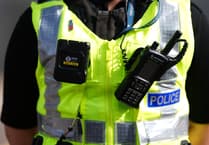A record number of potential slavery victims were referred to Gloucestershire Constabulary last year, new figures show.
The Modern Slavery and Human Rights Policy and Evidence Centre said the statistics show the "harsh reality" of modern slavery with thousands of people trapped and exploited in harsh conditions.
Recent Home Office figures show 89 potential victims of modern slavery – which includes any form of human trafficking, slavery, servitude or forced labour – were referred to Gloucestershire Constabulary in 2023.
It was up slightly from 87 referrals the year before and the highest since comparable records began in 2018.
Across the UK, some 17,004 potential victims of modern slavery were referred to the Home Office in 2023, up slightly from 16,921 in 2022.
It is the highest annual number since the National Referral Mechanism began in 2009.
Victoria Tecca, from the Modern Slavery and Human Rights Policy and Evidence Centre, said the statistics overall show "the harsh reality of modern slavery today: that thousands of people are trapped in situations they can’t get out of, exploited in harsh conditions, facing threats, violence and intimidation".
She added it is "particularly troubling" to see record numbers of children in the statistics.
There were 7,432 referrals for child potential victims – accounting for 44% of all referrals. It included 49 children aged under 17 referred to Gloucestershire Constabulary.
Maya Esslemont, director of After Exploitation which tracks modern slavery in the UK, said: "We remain deeply concerned that action is still not being taken to tackle the root causes of modern slavery, whilst the number of survivors is growing."
She added it is "vital that the Government addresses the gulf between survivors recognised by first responders and those who eventually go on to get support that addresses their needs."
The average waiting time from being referred to getting a first decision, known as a reasonable grounds decision, was 23 days, up from six days in the previous year.
The figures also showed a quarter of those referred to the NRM were of UK nationality (4,299), meaning it was the most common nationality for referrals.
The Home Office said this was likely due to the change in guidance which came in from January 2023 which means that in most cases, authorities "had needed to take additional action to request information demonstrating objective factors in order to make a decision".
A Home Office spokesperson said: "We are committed to tackling all forms of modern slavery, including for individuals in the UK and children. That is why we are removing protections for criminals and those who make false claims."
They added: "Decision makers consider all available evidence to determine whether a case should be referred to the system.
"This ensures victims promptly receive the support they need to rebuild their lives, whilst protecting the system from those who seek to misuse it."



-Lorraine-Fenner-Lee-Gough-(Megan-Baker-House)-and-Mark-Whitmore-with-the-cheque-for-14-0.jpeg?width=209&height=140&crop=209:145,smart&quality=75)
